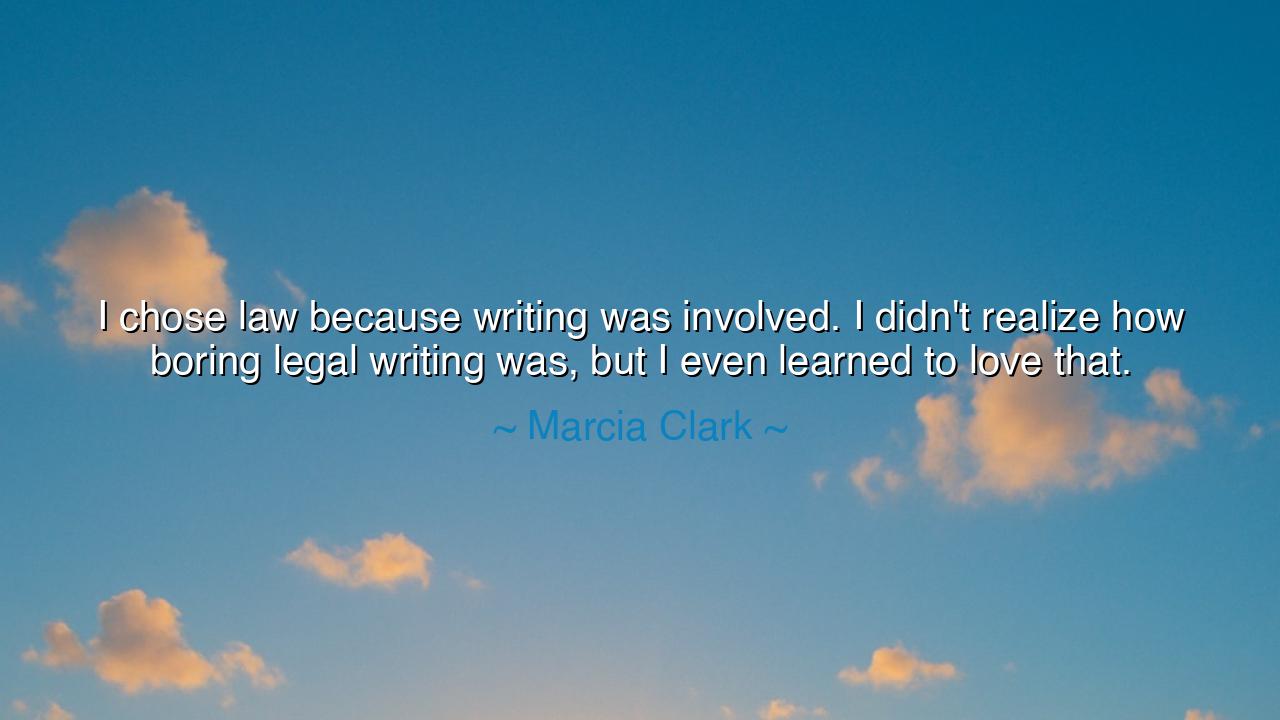
I chose law because writing was involved. I didn't realize how
I chose law because writing was involved. I didn't realize how boring legal writing was, but I even learned to love that.






The words of Marcia Clark, “I chose law because writing was involved. I didn’t realize how boring legal writing was, but I even learned to love that,” speak with the humility of one who has traveled far enough on the road of labor to find beauty even in its monotony. Beneath their modest humor lies a profound lesson — that passion is not always found in the glittering surface of things, but often in the quiet endurance of discipline. Clark’s reflection is the confession of a soul who sought purpose in words and found it, not in their poetry, but in their precision. It is a reminder that mastery begins when we learn to love not only the thrill of the dream, but the drudgery that sustains it.
The origin of this quote arises from the life of Marcia Clark, best known as the lead prosecutor in the infamous O.J. Simpson trial of the 1990s — a trial that captivated the world and tested the limits of the American legal system. Before fame and controversy, however, Clark was simply a young woman drawn to the world of words, believing that law would be a realm where her love of writing might flourish. Yet what she found was not the artistry of expression, but the rigid language of the law, stripped of emotion and bound by rules. To many, that realization might have bred resentment; but for Clark, it became an unexpected teacher. Through the labor of drafting arguments, motions, and legal briefs, she discovered that even in the dry bones of formality, there beats a living rhythm — the heartbeat of truth-seeking.
Her quote, spoken with the candor of experience, reminds us that the journey from inspiration to vocation is rarely as romantic as we imagine. The writer dreams of beauty, the lawyer dreams of justice — yet both must pass through tedium, repetition, and failure before the dream becomes real. In her words, we find an ancient truth: that love, in its truest form, is not born of delight, but of perseverance. Just as the craftsman learns to love the chisel that cuts his hands, so did Clark learn to love the craft that tested her patience. It is a truth that transcends professions — for every poet, philosopher, scholar, or artisan must come to terms with the unglamorous side of their calling. Endurance is the hidden face of passion.
There is wisdom here that the ancients themselves would have recognized. The philosopher Aristotle once wrote that virtue lies not in the act itself, but in the habit — in the discipline of doing well what must be done often. Clark’s acceptance of “boring legal writing” is a modern echo of that same truth. For even the dullest paragraph, when written with integrity, becomes a step toward excellence. The ancient scribes who copied sacred texts by hand knew this well: each stroke of the pen was a meditation, an offering. They did not write for glory, but for continuity, preserving knowledge for generations they would never see. So too, the legal writer preserves justice not in the spectacle of the courtroom, but in the clarity of her words.
Consider the story of Cicero, the Roman orator and statesman, whose legal writings shaped centuries of thought. His eloquence dazzled the Senate, yet his power came not from speeches alone, but from the painstaking work of drafting arguments, codifying principles, and refining language until it became both art and authority. Like Clark, Cicero knew that law is not mere rhetoric; it is the architecture of society, built stone by stone through words that may seem tedious but carry the weight of civilization. Thus, what appears boring in the moment often proves immortal in its consequence.
In Clark’s voice there is also gratitude — the humility of one who has learned that meaning can grow even in unpromising soil. She did not flee from the dullness of legal writing; she embraced it, and through it, found purpose. Her laughter in the face of boredom reveals a soul that has matured beyond the illusions of perfection. It is the laughter of the wise — of those who know that fulfillment lies not in excitement, but in commitment. What was once tedious becomes beloved when it serves something greater than the self. In learning to love even the driest parts of her work, she mastered not just law, but life.
Let this be the lesson for all who labor: the path of mastery is not always beautiful, but it is always sacred. Do not flee from boredom; refine it into patience. Do not despise the mundane; polish it until it shines with purpose. For the work that seems small today may be the foundation of something eternal. As Marcia Clark teaches us, even the most rigid form of writing — the legal brief, the statute, the clause — can become an act of devotion when pursued with love. And so, the wise learn this truth: that passion is not the fire that begins the journey, but the steady flame that endures through every dull and difficult hour until the work, like the soul, is complete.






AAdministratorAdministrator
Welcome, honored guests. Please leave a comment, we will respond soon